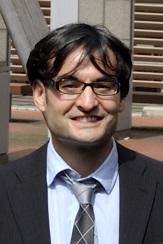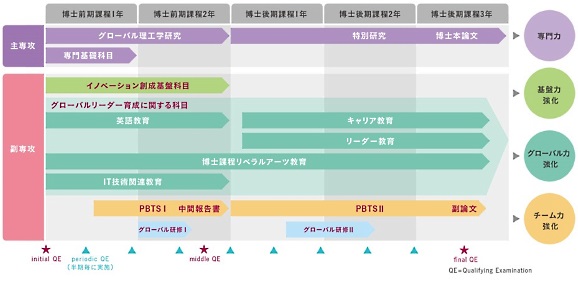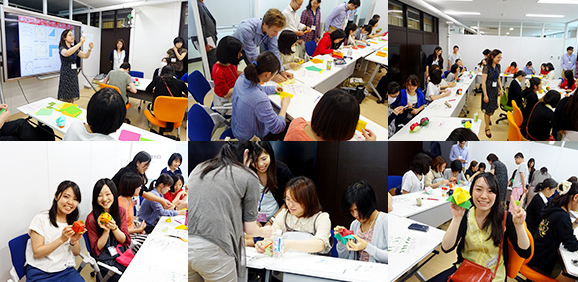 イノベーションを起こす人材となるための要件は、専門分野において学位を授与されるレベルの深い専門性をもち、物理・数学・情報の異なる専門分野にまたがる新たな課題を見出し解決していくだけの基盤力を有することです。グローバル理工学副専攻では、基盤力強化のためのコースワーク(イノベーション創成基盤科目)を設置しています。
イノベーションを起こす人材となるための要件は、専門分野において学位を授与されるレベルの深い専門性をもち、物理・数学・情報の異なる専門分野にまたがる新たな課題を見出し解決していくだけの基盤力を有することです。グローバル理工学副専攻では、基盤力強化のためのコースワーク(イノベーション創成基盤科目)を設置しています。
この度、このコースワークから、Essential Mathematics for Global LeadersⅡを開講することになりました。講師は、お茶の水女子大学プロジェクト教育研究院のXavier Dahan特任准教授が担当します。
博士前期・後期課程に所属する学生で関心のある方は、どなたでも履修することができます。なお、講義は英語で行われます。
“This lecture will introduce modelling with a Math Software basic notions that are necessary when a scientist is faced with a model involving differential equations. (Prof. Xavier Dahan)”
本講座の主旨
With Math Software like Mathematica, Maple, Mathlab, we don’t need to know a lot of Mathematics to use complicated math tools. Modelling with difficult differential equations is accessible to most Scientists and this lecture will show how to do that. With the help of Math Software, the basic language of Differential Equations will be introduced concretely and intuitively. Moreover the concepts will be put into practice in Mathematica with examples from Physics (mainly Mechanics), Chemistry (reaction kinetics), Biology (nerve membranes potential) etc. This lecture requires no more than a 1st year level in Mathematics and is open to all students in Science.
講義概要
| 科目名 | Essential Mathematics for Global LeadersⅡ [15S1007] | |
| 講師 | Dahan, Xavier (お茶の水女子大学プロジェクト教育研究院特任准教授) | |
| 対象 | 博士前期・後期課程 | |
| 場所 | 人間文化研究科棟408室 | |
| 内容 | 日時 | 講義テーマ |
| 10月8日(木)13:20~14:50 |
The materials of this lecture is divided into three parts (theory, examples, Mathematica). The lecture will advance by introducing these three parts “in parallel”, not sequentially. PART I (Theory) 1) Review on differential equations. 2) Systems of two 1st order linear differential equations. a. Fundamental matrix M, space phase, critical point (equilibrium solution). b. Eigenvalues of M behavior and stability of critical points 3) Nonlinear system of 1st order differential equations. a. Linearization (Linear approximation through the Jacobian matrix). b. Local behavior around critical points. Examples (Part II.1) c. Periodic solutions and limit cycles. d. Chaos (example: Lorenz equations Part II.1.) PART II (Examples) 1) General: Competing Species, Predator-Prey equations, Lorenz equations (strange attractors) 2) Physics: oscillator (pendulum, Van der Pol). 3) Chemistry: Rate equation (ex: Michaelis-Menten). Belousov-Zhabotinskii reaction 4) Biology: firing of nerve cell membrane, FitzHugh-Nagumo model. PART III (Mathematica) 1) Getting started with Mathematica. 2) Basic functions. Plotting. Sequences and lists, operations on lists. 3) DSolve. Closed form solutions. NDSolve. Numerical approximations. 4) Plotting solutions 5) Visualization tools. Graphics objects. |
|
| 10月15日(木)13:20~14:50 | ||
| 10月22日(木)13:20~14:50 | ||
| 10月29日(木)13:20~14:50 | ||
| 11月12日(木)13:20~14:50 | ||
| 11月19日(木)13:20~14:50 | ||
| 11月26日(木)13:20~14:50 | ||
| 12月3日(木)13:20~14:50 | ||
| 12月10日(木)13:20~14:50 | ||
| 12月17日(木)13:20~14:50 | ||
| 12月24日(木)13:20~14:50 | ||
| 1月7日(木)13:20~14:50 | ||
| 1月14日(木)13:20~14:50 | ||
| 1月21日(木)13:20~14:50 | ||
| 1月28日(木)13:20~14:50 | ||
講義のチラシはこちらからご覧になれます。
学生へのメッセージ
“Modelling with differential equations on a Math Software”
This lecture will introduce basic notions of modelling with a Math Software that are necessary when a scientist is faced with a model involving differential equations.Basic notions of differential equations, how to use of Mathematica for modelling differential equations, and practice with concrete examples from Physics, Chemistry, Biology will be introduced. This lecture requires no more than a 1st year level in Mathematics and is open to all students in Science, so feel free to come have a look!
履修登録
他の後期開講科目と同様にWeb上で履修登録をしてください。
履修登録期間: 10月 1日 ~ 10月14日
上記登録期間内に登録ができなかった場合には、学生センター棟1階学務課にご相談ください。
お問合せ
お茶の水女子大学 リーディング大学院推進センター
Tel: 03-5978-5775
E-mail:





